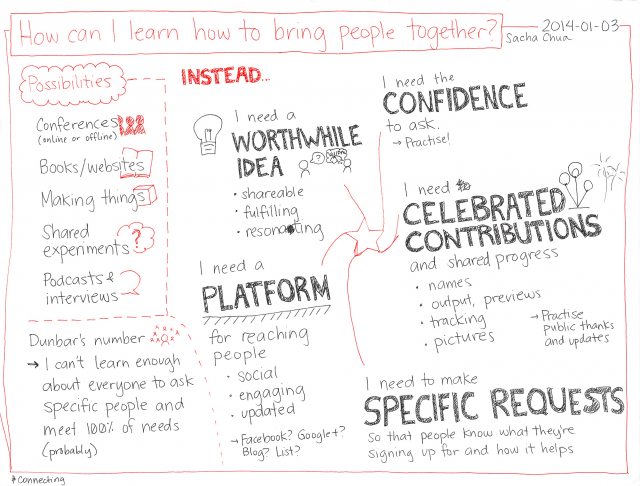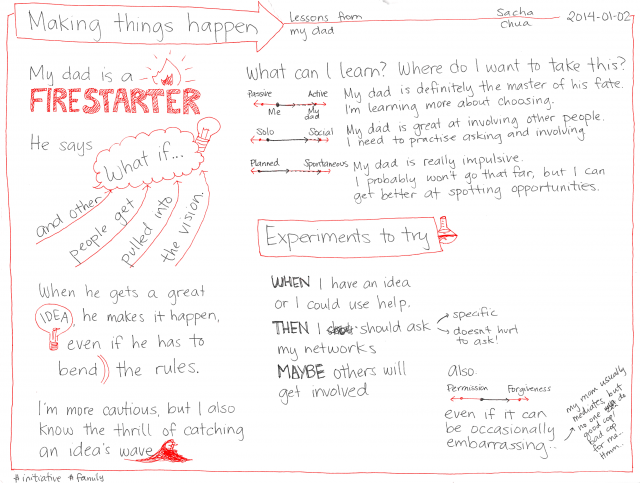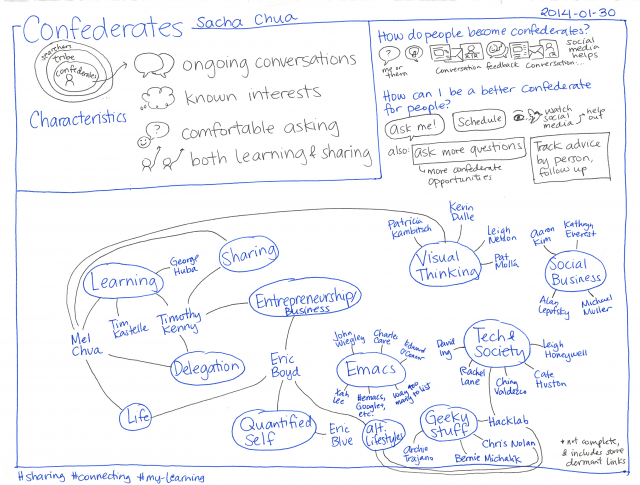From networking with people to networking around ideas: How I stopped worrying about keeping in touch
Posted: - Modified: | connectingI used to think a lot about how to keep track of the people I know, writing down notes about their interests in Emacs' aptly named Big Brother Database (BBDB). I wanted to be the kind of person who could remember people's goals and dreams, who paid attention to trivia from long-ago conversations. A little configuration allowed me to see my notes when reading or replying to e-mail from people, and I even wrote some code to track when I last contacted someone and filter the list of people so that I could focus on people I hadn't talked to in a while. It was amusing to see a record and realize I'd actually known someone for years (these things sneak up on you before you know it!), and it was occasionally gratifying to be able to look up someone based on an interest I vaguely remembered them having and to make the connection with a book I'd just read or someone else they should meet.
I kept tweaking this system. Maybe there was a contact relationship management tool out there that could help me remember what was important to people's lives or discover small-talk topics from people's social media updates. Maybe there was an application that could help me act thoughtfully, beyond the usual flood of Facebook wall messages on someone's birthday. Maybe there was a way for me to learn how to keep in touch. I asked people who networked for a living (mostly salespeople and politicians) how they managed to remember all these little details and reach out. They told me about spreadsheets and index cards, phone calls and e-mails: “Hi, how are you doing? Was just thinking of you. What's up?” I was inspired by examples of super-connectors who somehow managed to remember everyone's faces and names, asking after kids and pets and hobbies, effortlessly breaking through the limits of Dunbar's number. (Or at least it seemed effortless; many worked very hard at this.) I tried out systems like Nimble and Contactually as a way to see people's activity across platforms and remember to keep in touch. I tried ConnectedHQ (no longer available?) and Sunrise for people-related notes in my calendar. I followed Facebook and LinkedIn's suggestions to greet people on their birthdays or job changes.
Still, those practices never quite felt natural. Maybe I'm just not a people person, at least not that kind. I never became comfortable with calling someone out of the blue, and I preferred posting stories on my blog instead of telling them one-on-one through e-mail or conversation.
I decided to try a different approach: I stopped worrying about keeping in touch. If people came into my life, great. If people drifted out, that was fine too. Instead of working on keeping those relationships going, I focused instead on being open to the conversations as they came up. Instead of reaching out so that I can hear about what people are working on and stay on their radar, I decided to focus on what I was curious about and be open to the people I'd bump into along the way.
Sure, I might have missed a few serendipitous connections with people who were quietly working on interesting things–but the world is full of other people who make it easy to keep up with them, like the way my blog makes it easy to keep up with what I'm interested in. I subscribe to a number of people's blogs and I follow people on social networks. But for the most part, I care about ideas and conversations first, and then getting to know and keep in touch with people happens along the way.
It's a very different form of networking, I think, than what I've read about in countless books. I still recommend books like How to Talk to Anyone (Lowndes) and Never Eat Alone (Ferrazzi) to people who are curious about building relationships with specific people or making the most of networking events. Me, I'm learning about how to talk to everyone. Instead of building a relationship with a specific person, I look for opportunities to help people around an idea or contribute to a group. Instead of asking a specific person for help, I ask in general, and people step forward if they're interested. I don't have to fear rejection, and no one has to look for tactful ways to say no; and if a request doesn't get any takers, well, I'm where I would've been anyway.
In order to make that work, I need to make sure I have good ideas that people want to be part of, the confidence to share them, a platform for sharing them with, specific requests and ways people can get involved, and a way to celebrate how people are helping. I like that. It turns networking into something more than “I think you're cool and I want to stay in touch” or even “You're working on cool stuff; How can I help?” – it becomes “We're all part of something bigger. Let's make things happen.”
I'd been trying this approach over the past few years. Watching my dad do it was a real eye-opener. My dad works Facebook like a pro, posting ideas and stories and the occasional request. He has probably never taken notes on someone's interests. He probably doesn't spend time cataloging people's goals and passions. As it turns out, he does take a few notes, and he asks my mom if he needs help remembering. (At least my sister says so!) Still, I don't even know if it's possible to remember all these little details about the thousands of Facebook friends that he has. If he got the hang of working with fan pages, he'd probably have even more fans. He might ask one or two people who come to mind, but in general, he shares and asks generally. And stuff happens!
I'm working on sharing, learning from people, asking for help, and making it easy for people to build on what we have in common. I'll get there someday. It's not so much that I want to keep in touch with a specific person; it's that we're both actively thinking about a topic, so maybe we'll set up a conversation so we can exchange notes and learn together. It's not so much that I want to have a wide range of skills in my roster of contacts; it's more that I want to provide value to a wide range of people, and maybe some of them will want to help me when the opportunity comes up.
I was thinking about the way people are related to topics so that I can nudge myself to reach out more for questions and conversations. I like the idea of confederates: people who are actively learning about similar things, and whom I'm comfortable asking if I want a different perspective or I'm curious about what they're learning. I don't have any set schedule for reaching out to these people. If I learn something they might be interested in, I'll mention it to them, but I'll also open up the conversation to everyone who might be interested. When I started drawing out the map, I realized how lucky I was to have so many people I can learn from and who might find stuff I'm learning useful too. This is how I keep in touch now – through the exchange of questions and ideas.
So I might not build as close a relationship as you might with someone who takes the time to send you birthday cards or calls you up every quarter, but then do you really feel all that close to insurance or real estate agents who send you cards like clockwork? I don't send “Hi, what's up?” e-mails and I tend to not be very good at responding to them, but I'll dive deeply into topics of mutual curiosity. My network is shifting to people who share what they know and what they're learning. While that means I'm probably missing out on a lot of stuff that never gets shared beyond the small circles most people are comfortable in, there are so many good people out there focused on bringing everyone up–not just the people they've bumped into. It might also mean that I'm not as close to the people for whom these little gestures mean a lot, but it means that I draw closer to people who don't have that need. It's like the difference between someone who puts you on the spot when you forget your name and someone who helpfully supplies it at a hint of hesitation; someone who makes you feel bad for forgetting their birthday or anniversary or whatever, and someone who's more focused on what's good instead of what's missing.
You don't have to wish me a happy birthday, and you never have to apologize for replying slowly or not being in touch. Better to share your questions and ideas, and better to share that not just with me but with the world.



